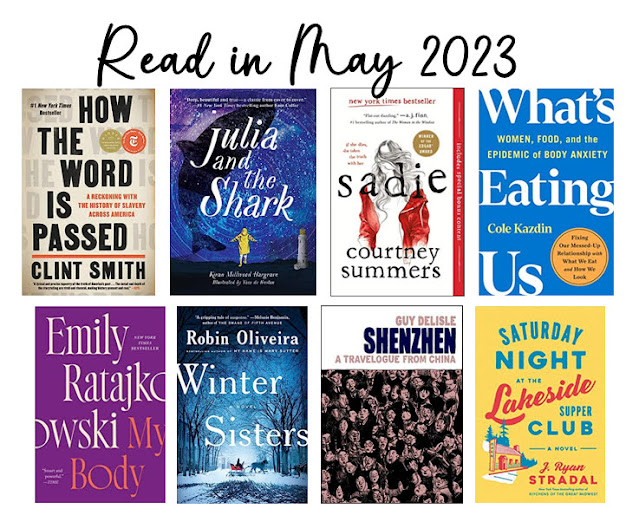Friends, this reading month was a bust. In addition to giving up on at least four books, most of the ones I did finish weren't all that great. They can't all be winners, I guess? But, let's start with the two I did like:
How the Word is Passed: A Reckoning with the History of Slavery Across America by Clint Smith is a 5-star read, hands down. This is how nonfiction is done. In addition to being a beautiful writer (the author is also a poet), Smith stays on task, backs up all his assertions with evidence, and doesn't hide facts that don't jive with his personal opinion. He also challenges assumptions: he includes a chapter about slavery in New York (most of which I didn't know), showing that the North wasn't blameless. He also visits a plantation in Louisiana that holds up the stories of the people who were enslaved there. Everyone should read this book - even if you think you know everything there is to know about American slavery, I guarantee you'll learn something.
Julia and the Shark by Kiran Millwood Hargrave, illustrated by Tom de Freston is an illustrated middle grade book about a young girl and her family who move to Shetland for the summer so her father can repair a lighthouse and her mother can conduct research on the Greenland shark. I have been wanting to read this because I love Shetland as a setting, so I requested that my library buy it, and they did! The illustrations are gorgeous and add to the atmosphere, so this is a must-read in print. In the end it's a story of mental illness, which is handled really beautifully.
And the ugh, fine, whatever, meh:
Sadie by Courtney Summers is a YA book (which I did not know going into it) about a teenager who is tracking her sister's killer. There is also a podcaster who is tracking Sadie, so the chapters alternate between Sadie's perspective and the podcast. The audio was pretty fun because the podcast sections really do sound like podcasts. There is some dark child abuse stuff in here, and the ending is unsatisfactory. I'd say it was just fine.
Ya'll, I can't with the subtitles these days. What's Eating Us: Women, Food, and the Epidemic of Body Anxiety by Cole Kazdin is already long, but then there's another block of text on the cover: Fixing Our Messed-Up Relationship with What We Eat and How We Look. The book was none of these things! Frankly, it was all over the place. It deals with: eating disorders, different types of treatments, body positivity, diet culture, healthcare inequalities, infertility, exercise, and a million other topics, mixed into a memoir of the author's own eating disorder. There's also a whole chapter on her infertility and adoption of her son, which seems very out of place. Most annoying of all, there are several anecdotes that go something like this: "My friend was complaining about being fat - but she totally isn't!" If you're interested in this topic, there are a lot of other, better books you could read.
My Body by Emily Ratajkowski: I have so many opinions about this book. In fact, I debated writing about it at all. If you don't know (I didn't), Emily Ratajkowski is a model. The stories she tells about how men in the industry (and in life) treat her are abhorrent. No one should be assaulted, ever. People should be treated as a whole person, regardless of their appearance. BUT. Then I looked up her Instagram. She is obviously using the beauty industry to her advantage, making tons of money and cementing a future for herself and her family. However, she is doing in a way that plays into every unachievable standard, and she does not call anyone out for this. She doesn't talk much in her book about how she achieves her body, only on two occasions mentioning "keeping weight off" after being sick and "skipping meals." She has a huge opportunity, with 30 million (!!) followers, to highlight what it takes for her to maintain her body shape (particularly for a woman who has given birth). I don't expect everyone to take up the torch to fight diet culture, but when you have an audience that big, the expectations and responsibilities are bigger to match.
Winter Sisters by Robin Oliveira: So, this book is about child rape. I didn't realize this at first, and it doesn't become apparent until 100 pages in. I finished it because I wanted to see what happened, but I really wish I had known the content, because I would have skipped it.
Shenzhen: A Travelogue from China by Guy Delisle: I have been slowly working my way through all of Delisle's graphic novels. This one seems to be in a completely different style than his others. The drawings seem rougher, like they were done with pencil. I did enjoy the facts I learned about China, but Delisle doesn't hide the fact that he doesn't like the part of the country he's in. He's always trying to go somewhere else, and in general doesn't seem respectful of the culture. In fact this is something I'm sensing in all of his books - I'm almost finished with his last one, so more on that next month.
Saturday Night at the Lakeside Supper Club by J. Ryan Stradal: This book is objectively pretty good. However, lots of sad things happen in it and I just was not in the mood after this month of heavy topics.



















